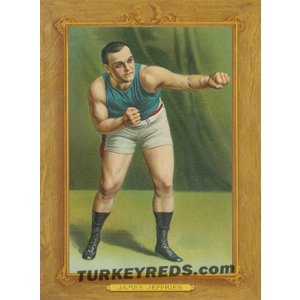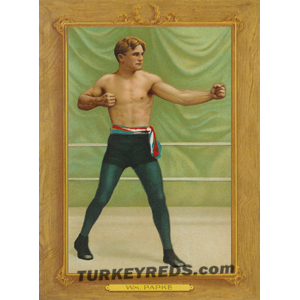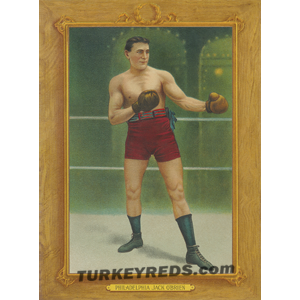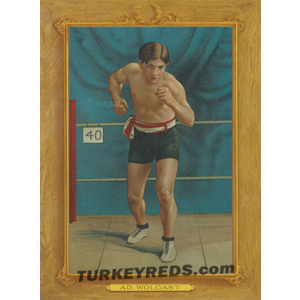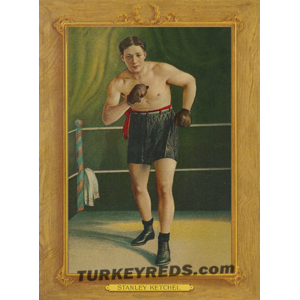Description
High resolution image available
James Jeffries
Born: April 15, 1875 Carroll, Ohio
Died: March 3, 1953 (aged 77) Burbank, California
Height: 6’1″
Weight: 225 lbs
Division: Heavyweight
Record:
Total fights: 23
Wins: 19
Wins by KO: 14
Losses: 1
Draws: 2
No contests: 1
Biography:
The “Boilermaker” was known for his enormous strength and stamina. He could run 100 yards (91 m) in just over ten seconds, and could high jump over 6 feet (180 cm). Using a technique taught to him by his trainer, former Welterweight and Middleweight Champion Tommy Ryan, Jeffries fought out of a crouch with his left arm extended forward. He was able to absorb tremendous punishment while wearing his opponents down. A natural left-hander, he possessed one-punch knockout power in his left hook, and brawled his way to the top of the rankings.
Jeffries boxed as an amateur until age 20, when he started fighting professionally. In his third fight, Jeffries knocked out the highly regarded boxer Hank Griffin in the fourteenth round. Jack Johnson had fought Griffin on three separate occasions. Jeffries fought the top heavyweight contender, Gus Ruhlin, to a draw. Ruhlin was knocked down with a brutal punch at the end of the final round and was saved by the bell from being counted out. The decision was met with unfavorable reactions from the audience, many of whom felt Jeffries won.
On December 26, 1908, Jack Johnson defeated Canadian Tommy Burns to win the heavyweight championship. Jeffries publicly criticized Burns for giving Johnson a shot at the title. “The Canadian never will be forgiven by the public for allowing the title of the best physical man in the world to be wrested from his keeping by a member of the African race,” Jeffries stated. “I refused time and again to meet Johnson while I was holding the title, even though I knew I could beat him. I would never allow a negro a chance to fight for the world’s championship, and I advise all other champions to follow the same course.”
Many called for Jeffries to return to the ring and recapture the championship from Johnson, who had become the most hated man in White America, for the Caucasian race. They dubbed him the “Great White Hope.” For months, Jeffries, who had become a 300-pound alfalfa farmer, resisted all offers. But promoter Tex Rickard was able to lure him out of retirement with an offer of $101,000, a then-record purse. Jeffries felt compelled to accept, and the fight was set for San Francisco on July 4, 1910. Johnson said, “He can never get into his former good trim.” He was right. Although Jeffries lost the weight in training and looked the part, his hand-eye coordination and reflexes had lost their sharpness. He knew he was in trouble. “It was plainly evident that he was suffering a terrible mental struggle,” said Joe Choynski. On June 15, when boxing opponents in Washington, D.C., persuaded California to cancel the fight, it was moved to the little known city of Reno, Nevada. However, Jeffries said he wouldn’t fight in Reno, an obvious tactic to pull out. But the wily promoter Rickard claimed impending bankruptcy should Jeffries make good on his threat. Jeffries eventually agreed not to pull out and set up camp outside Reno.
Jeffries worked himself down to 227 pounds by the day of the fight, which took place in a stadium specifically built to house the crowd of more than 16,000. Johnson, perhaps the cleverest boxer of his generation, was in his prime and easily smothered Jim’s bullish rushes. He dodged, held and pushed the ex-champion, sapping Jim’s strength as the fight wore on under the desert afternoon sun. At no point was Jeffries able to assert control of the fight or land a single telling blow. In the fifteenth of forty-five scheduled rounds, Johnson floored Jeffries for the first time in his professional career. Though Jeffries rose to his feet and was allowed to continue, he collapsed again just seconds later and the referee stopped the fight. “I never could have whipped Johnson at my best,” Jeffries said in the immediate aftermath of the fight. “I could not have reached him in 1,000 years.” However, in his 1929 autobiography, Jeffries argued that he had been doped before the fight by a turncoat in his camp, but his story was discounted.
More info:
https://en.wikipedia.org/wiki/James_J._Jeffries
http://boxrec.com/media/index.php/James_J._Jeffries
